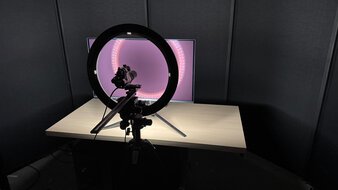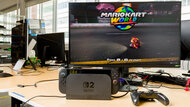
One of the latest advancements in monitor technology is OLED panels, which have become more popular over the past few years. They're different from LCD panel types because instead of having a backlight, they have individual pixels that can turn on and off. This helps them display perfect blacks in dark rooms without any blooming around bright objects. Besides their superior picture quality versus LCD displays, most OLEDs are beneficial for gaming as they have a near-instantaneous response time for sharp motion.
However, there are downsides to using an OLED, as they're prone to burn-in when exposed to the same static elements over time, like if you only use it for work all day, every day. That said, there's less of a risk of burn-in if you use the monitor for varied usage. They also don't get as bright as many LED-backlit LCD monitors, and they're best used in a dark environment. Plus, the black levels rise and dark colors desaturate more quickly in bright rooms on QD-OLEDs than WOLEDs. That said, QD-OLEDs generally offer the best picture quality with more vivid colors.
There are many different OLED models out there, including both WOLED and QD-OLED, with various sizes, resolutions, and refresh rates. Since many models use the same panel as their competitors, choosing one over another can come down to features, price, and availability, which we consider for this recommendation. Luckily, we put each OLED that we buy through our extensive testing, which includes nearly 400 tests to recognize these minor differences and help you make a buying decision.
We've bought and tested more than 360 monitors, and below are our picks for the best OLED monitors available. See our recommendations for the best HDR gaming monitors, the best HDR monitors, and, if you're concerned about the risk of burn-in, the best Mini LED monitors. Check out the best OLED TVs, too, and learn about the best monitor brands.
Quick Look





Best OLED Monitor
 PC Gaming9.1Console Gaming9.4HDR Picture9.4SDR Picture10Brightness7.2Response Time9.9Color Accuracy9.2Size27"Max Refresh Rate240 HzPixel TypeQD-OLEDSee all our test resultsNative Resolution3840 x 2160
PC Gaming9.1Console Gaming9.4HDR Picture9.4SDR Picture10Brightness7.2Response Time9.9Color Accuracy9.2Size27"Max Refresh Rate240 HzPixel TypeQD-OLEDSee all our test resultsNative Resolution3840 x 2160The best OLED gaming monitor we've tested is the ASUS ROG Swift OLED PG27UCDM. It's a QD-OLED that combines a 4k resolution with a 240Hz refresh rate, making it ideal for gamers who want a responsive feel and a detailed image. It has everything you'd expect from a premium OLED gaming monitor, like a near-instantaneous response time for sharp motion. It also takes full advantage of gaming consoles and modern graphics cards because it supports both HDMI and DisplayPort 2.1 bandwidth. It even has remarkable HDR picture quality with vivid colors and bright highlights, which is what you should expect with a QD-OLED.
One of the advantages of getting it is that it has high pixel density, and it doesn't have fringing around text like on larger OLEDs. The ASUS is part of a group of 27-inch, 4k QD-OLEDs that all perform similarly. This particular model is worth getting over other options because it has some extra features, like a USB hub and KVM switch, and it also supports Dolby Vision, which is a nice touch for a gaming monitor. However, you can also check out the Dell Alienware AW2725Q if you want something cheaper, but it doesn't get as bright as the ASUS.
Best 32-Inch OLED Monitor
 PC Gaming9.1Console Gaming9.4HDR Picture9.4SDR Picture10Brightness7.2Response Time9.9Color Accuracy9.2Size32"Max Refresh Rate240 HzPixel TypeQD-OLEDSee all our test resultsNative Resolution3840 x 2160
PC Gaming9.1Console Gaming9.4HDR Picture9.4SDR Picture10Brightness7.2Response Time9.9Color Accuracy9.2Size32"Max Refresh Rate240 HzPixel TypeQD-OLEDSee all our test resultsNative Resolution3840 x 2160If you find that the 27-inch screen of the ASUS ROG Swift OLED PG27UCDM is too small for your needs, there are more 32-inch QD-OLEDs you can also consider. If that's what you're interested in, the best one is the Gigabyte AORUS FO32U2P. It's actually very similar to the ASUS because its QD-OLED panel delivers nearly the same picture quality and gaming performance. It has similar features, too, as it also supports DisplayPort and HDMI 2.1 bandwidth, and it also comes with a USB hub and KVM switch. One difference is that it doesn't support Dolby Vision, though.
Although its 32-inch screen provides a more immersive feel for gaming, one thing you have to consider is that it has lower pixel density with its 4k resolution. This means that text doesn't look as sharp, and there's some fringing around letters that you may notice, depending on how sensitive you are to it. That said, this is the trade-off for getting a bigger screen, and it's the same case with most 32-inch, 4k OLEDs.
Best 1440p OLED Monitor
 PC Gaming9.2Console Gaming9.1HDR Picture9.5SDR Picture10Brightness7.2Response Time9.8Color Accuracy8.9Size27"Max Refresh Rate360 HzPixel TypeQD-OLEDSee all our test resultsNative Resolution2560 x 1440
PC Gaming9.2Console Gaming9.1HDR Picture9.5SDR Picture10Brightness7.2Response Time9.8Color Accuracy8.9Size27"Max Refresh Rate360 HzPixel TypeQD-OLEDSee all our test resultsNative Resolution2560 x 1440If you don't need a 4k OLED like the Gigabyte AORUS FO32U2P or the ASUS ROG Swift OLED PG27UCDM, there are plenty of 1440p OLEDs you can get for cheaper, like the ASUS ROG Strix OLED XG27ACDNG. Although the lower resolution results in less sharp and detailed images than on 4k monitors, it also requires less bandwidth from your graphics card to reach high frame rates. It's also why most 1440p OLEDs have higher refresh rates than 4k OLEDs, as the XG27ACDNG has a 360Hz refresh rate for a smoother feel.
Besides the lower resolution, it has picture quality similar to that of the higher-end PG27UCDM and the Gigabyte, as it's another QD-OLED. It comes with all its benefits, including a wide range of vivid colors. While it doesn't have DisplayPort 2.1 bandwidth like the other two monitors, it still has HDMI 2.1 bandwidth to support any signal from gaming consoles, but 4k signals are downscaled to 1440p. While it's worth getting because it tends to cost less than the competition, there are some cheaper 1440p WOLEDs you can also check out, like the ASUS ROG Strix OLED XG27AQDMG. This is worth getting if you want a more affordable OLED, but it has a lower 240Hz refresh rate than the XG27ACDNG.
Best 480Hz OLED Monitor
 PC Gaming9.2Console Gaming9.0HDR Picture8.9SDR Picture9.9Brightness6.7Response Time9.9Color Accuracy8.4Size27"Max Refresh Rate480 HzPixel TypeOLEDSee all our test resultsNative Resolution2560 x 1440
PC Gaming9.2Console Gaming9.0HDR Picture8.9SDR Picture9.9Brightness6.7Response Time9.9Color Accuracy8.4Size27"Max Refresh Rate480 HzPixel TypeOLEDSee all our test resultsNative Resolution2560 x 1440If you're looking for the best OLED gaming monitor and need the highest refresh rate possible, there are some 480Hz gaming OLEDs, like the LG 27GX790A-B. It's a 1440p monitor like the ASUS ROG Strix OLED XG27ACDNG, but the higher refresh rate is ideal if you want the smoothest and most responsive feel possible. One difference with the ASUS is that it isn't a QD-OLED, so colors are less vivid; instead, it has a WOLED panel. That means you still get all the benefits of an OLED with perfect blacks against bright highlights and incredibly sharp motion. The black levels don't rise as much in a bright room either, but you still need to use it in a dark room to get perfect black levels.
It supports HDMI and DisplayPort 2.1 bandwidth, which is great if you have a high-end graphics card that can take advantage of those ports. While a 1440p, 480Hz OLED like this one is ideal for PC gaming, it isn't the best for console gaming because it has to downscale 4k signals. Instead, you can look into the LG 32GS95UE-B if you want a more versatile option. It's a native 4k, 240Hz monitor with a Dual-Mode feature that switches to a 1080p resolution with a 480Hz refresh rate, so it's fantastic no matter the gamer you are. That said, it also costs more than the 27GX790A-B.
Best Ultrawide OLED Monitor
 PC Gaming9.0Console Gaming8.9HDR Picture8.7SDR Picture9.9Brightness6.9Response Time9.9Color Accuracy9.0Size34"Max Refresh Rate240 HzPixel TypeOLEDSee all our test resultsNative Resolution3440 x 1440
PC Gaming9.0Console Gaming8.9HDR Picture8.7SDR Picture9.9Brightness6.9Response Time9.9Color Accuracy9.0Size34"Max Refresh Rate240 HzPixel TypeOLEDSee all our test resultsNative Resolution3440 x 1440Although most OLEDs have a 16:9 aspect ratio, like the monitors mentioned above, there's a different class of OLEDs with a 21:9 aspect ratio. These 34-inch ultrawide displays offer more horizontal screen space, which is great for immersion while playing atmospheric games. If you're interested in that, check out the LG 34GS95QE-B. It has a WOLED panel, so the picture quality is similar to the LG 27GX790A-B, and while it has a lower 240Hz refresh rate, it's still good enough even for competitive gamers.
Unlike the other OLEDs mentioned above, this one has a curved screen that helps bring the edges of the screen closer to your field of vision. This is the case with any ultrawide OLED, but you may find its 800R curve too aggressive if you've never used a curved display before. You can even consider the Dell Alienware AW3423DWF if you want a less-aggressive 1800R curve. Its QD-OLED panel also delivers more vivid colors, but it has a lower 165Hz refresh rate than the LG.
Notable Mentions
- Sony INZONE M10S:
The Sony INZONE M10S is a 1440p, 480Hz monitor that competes with the LG 27GX790A-B. Both perform so similarly, and you can't go wrong with either, but the LG is usually a bit cheaper.
See our review - ASUS ROG Swift OLED PG32UCDM:
The ASUS ROG Swift OLED PG32UCDM is a 32-inch QD-OLED that competes with the Gigabyte AORUS FO32U2P. It's something to consider if you want a cheaper option or something with Dolby Vision support, but it doesn't have DisplayPort 2.1 bandwidth.
See our review - Dell Alienware AW3225QF:
The Dell Alienware AW3225QF is an alternative to the Gigabyte AORUS FO32U2P if you want a curved QD-OLED. It performs similarly, but only consider it if you're fine with getting a curved display.
See our review - Gigabyte AORUS FO27Q3:
The Gigabyte AORUS FO27Q3 is a 1440p, 360Hz QD-OLED that competes with the ASUS ROG Strix OLED XG27ACDNG. Because they perform so similarly, you can't go wrong with either, and you should get whichever you can get for cheaper, but the Gigabyte can be harder to find.
See our review - Samsung Odyssey OLED G9/G95SC S49CG95:
The Samsung Odyssey OLED G9/G95SC S49CG95 is a 49-inch ultrawide QD-OLED that's an alternative to the LG 34GS95QE-B if you want a bigger screen. It also has better picture quality thanks to its QD-OLED panel, but it tends to cost more.
See our review
Recent Updates
We made several changes according to price and availability, and for consistency with other recommendations. We replaced the MSI MPG 321URX QD-OLED with the Gigabyte AORUS FO32U2P and renamed it to the 'Best 32-Inch Monitor.' We also renamed the ASUS ROG Swift OLED PG27UCDM to the 'Best Monitor.' We replaced the MSI MPG 271QRX QD-OLED, Sony INZONE M10S, and the MSI MPG 341CQPX QD-OLED with the ASUS ROG Strix OLED XG27ACDNG, LG 27GX790A-B, and the LG 34GS95QE-B, respectively. In the Notable Mentions, we replaced the 27GX790A-B, MSI MPG 322URX QD-OLED, and the ASUS ROG Strix OLED XG27AQDMG with the M10S, ASUS ROG Swift OLED PG32UCDM, and the Samsung Odyssey OLED G9/G95SC S49CG95.
We added the ASUS ROG Swift OLED PG27UCDM as the 'Best 27-Inch Monitor' to give another option and renamed the MSI MPG 271QRX QD-OLED to the 'Best 1440p Monitor.' In the Notable Mentions, we replaced the ASUS ROG Strix OLED XG27ACDNG and the ASUS ROG Swift OLED PG32UCDM with the LG 27GX790A-B, the MSI MPG 322URX QD-OLED, and the ASUS ROG Strix OLED XG27AQDMG to reflect changes in the recommendation and the current monitor market.
We replaced the Samsung Odyssey OLED G8/G80SD S32DG80 with the MSI MPG 321URX QD-OLED for consistency with other recommendations, as the MSI is cheaper. We also replaced the LG 32GS95UE-B with the Sony INZONE M10S and renamed it the 'Best 480Hz Monitor' to represent the current market better. In the Notable Mentions, we replaced the Dell Alienware AW2725DF and the ASUS ROG Swift OLED PG32UCDP with the ASUS ROG Strix OLED XG27ACDNG and the Gigabyte AORUS FO27Q3. We introduced a new format to the recommendation and updated the text to reflect these changes.
We replaced the Gigabyte AORUS FO27Q3 and the Dell Alienware AW3423DWF with the MSI MPG 271QRX QD-OLED and the MSI MPG 341CQPX QD-OLED, respectively, for consistency with other recommendations. We replaced the Samsung Odyssey OLED G9/G95SC S49CG95 with the ASUS ROG Swift OLED PG32UCDP in the Notable Mentions.
Oct 07, 2024: We updated the recommendation to reflect the current OLED monitor market. We replaced the Dell Alienware AW2725DF with the Gigabyte AORUS FO27Q3 for consistency with other recommendations and because the Gigabyte has more features. In the Notable Mentions, we replaced the Samsung Odyssey OLED G6/G60SD S27DG60 and the MSI MPG 321URX QD-OLED with the AW2725DF, ASUS ROG Swift OLED PG32UCDM, and the Dell Alienware AW3225QF to reflect changes in the recommendation.
All Reviews
Our recommendations are based on what we think are the best monitors with an OLED panel currently available, including the best OLED gaming monitor. They're adapted to be valid for most people in each price range. The rating is based on our review, factoring in price and feedback from our visitors.
If you'd prefer to make your own decision, here's the list of all of our OLED monitor reviews. Be careful not to get too caught up in the details. Most monitors are good enough to please most people, and the things we fault monitors on are often not noticeable unless you really look for them.
Comments
Best OLED Monitors: Main Discussion
What do you think of our picks? Let us know below.
Looking for a personalized buying recommendation from the RTINGS.com experts? Insiders have direct access to buying advice on our insider forum.
We’ve just released a new video that mentions the LG 32GS95UE-B here.
- 21010
Is fo27q2 and q3 the same except for refresh rate? I’m planning to build a ~1400 dollar pc on next gen gpus for cod and triple a and 240hz is perfectly good
Although we haven’t tested the FO27Q2 and we don’t know exactly how it performs, we still expect it to be similar to the FO27Q3, besides the refresh rate.
- 21010
Is fo27q2 and q3 the same except for refresh rate? I’m planning to build a ~1400 dollar pc on next gen gpus for cod and triple a and 240hz is perfectly good
We’ve just released a new video that mentions the LG 32GS95UE-B, Gigabyte AORUS FO27Q3, and Samsung Odyssey OLED G8/G80SD S32DG80 here.
- 21010
still torn between samsung g8 and the msi mpg. i get pretty much the only difference is the matte vs. glossy finish. but i dont mind dimming down the lits a little to get that extra color. anyone seen both of these in person and can give recommendation?
Hey, based on what I’ve seen in person between the two, the big difference really does come down to the coating. Honestly speaking, it comes down to preference, but if you want to use it in a dark room, there’s where the glossy panel of the MSI has an advantage. The image looks clearer, and at least in a dark room you won’t see distracting reflections. But in a bright room, the Samsung is better because blacks don’t look as purple as on the MSI, and it diffuses reflections better.
- 21010
still torn between samsung g8 and the msi mpg. i get pretty much the only difference is the matte vs. glossy finish. but i dont mind dimming down the lits a little to get that extra color. anyone seen both of these in person and can give recommendation?
We’ve just released a new video that mentions the LG 32GS95UE-B here.
- 21010
Why isn’t the ASUS ROG Swift OLED PG32UCDM mentioned on this review?
We take a few factors into consideration for recommendations, including price. The ASUS is generally more expensive than the other options, so it isn’t worth recommending when it performs the same. That said, we’ll considering adding a mention of it in the future :)
- 21010
Why isn’t the ASUS ROG Swift OLED PG32UCDM mentioned on this review?
We’ve just released a new video that features the LG 32GS95UE-B and also mentions the Samsung Odyssey OLED G8/G80SD S32DG80 here.










































































